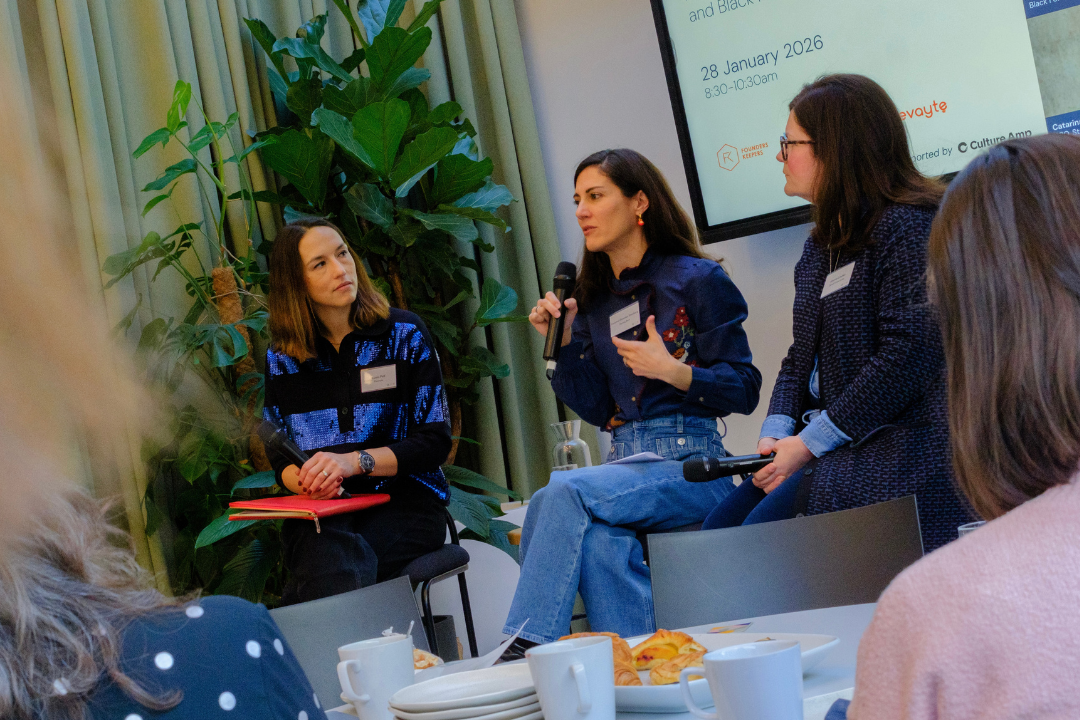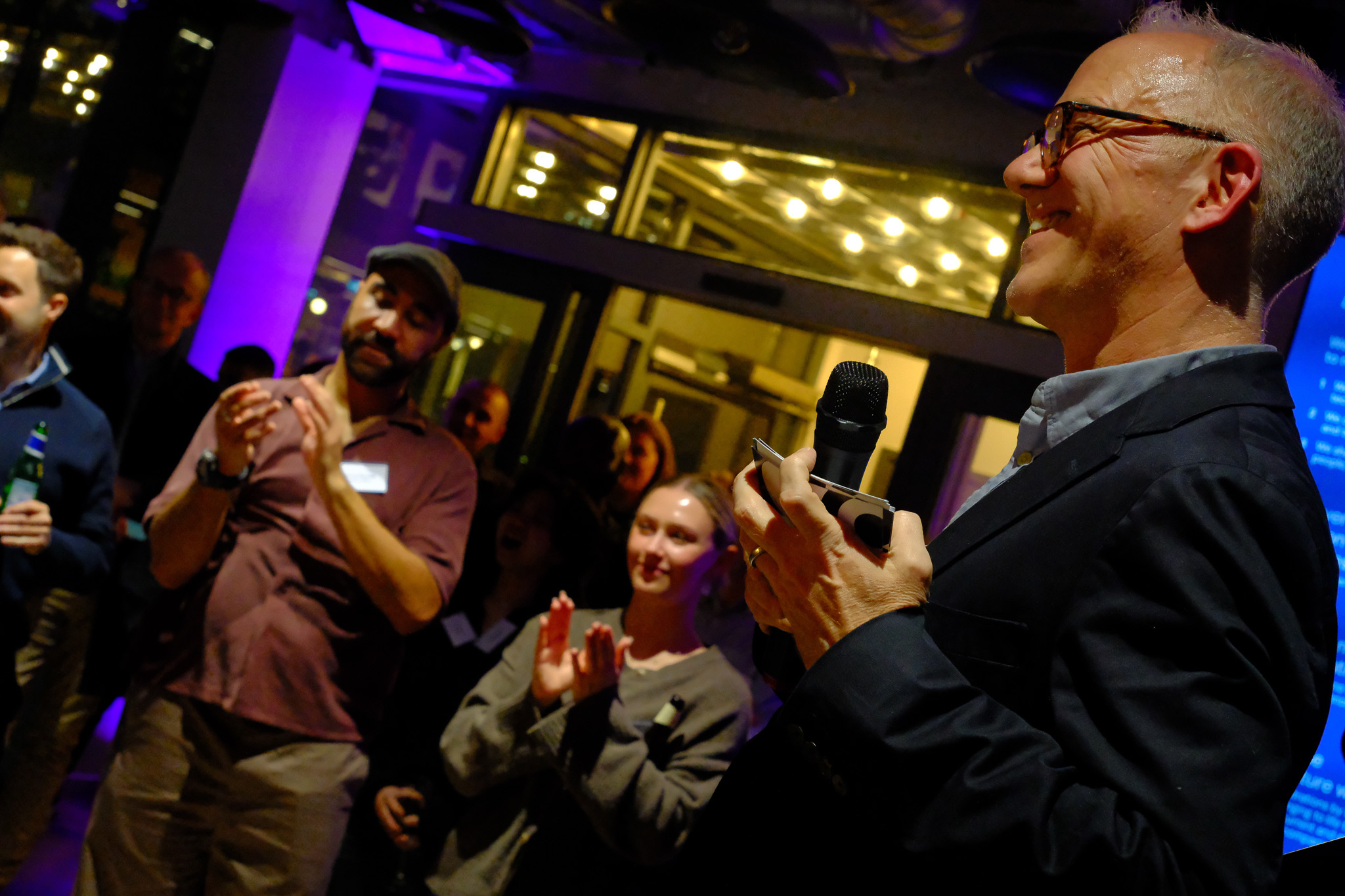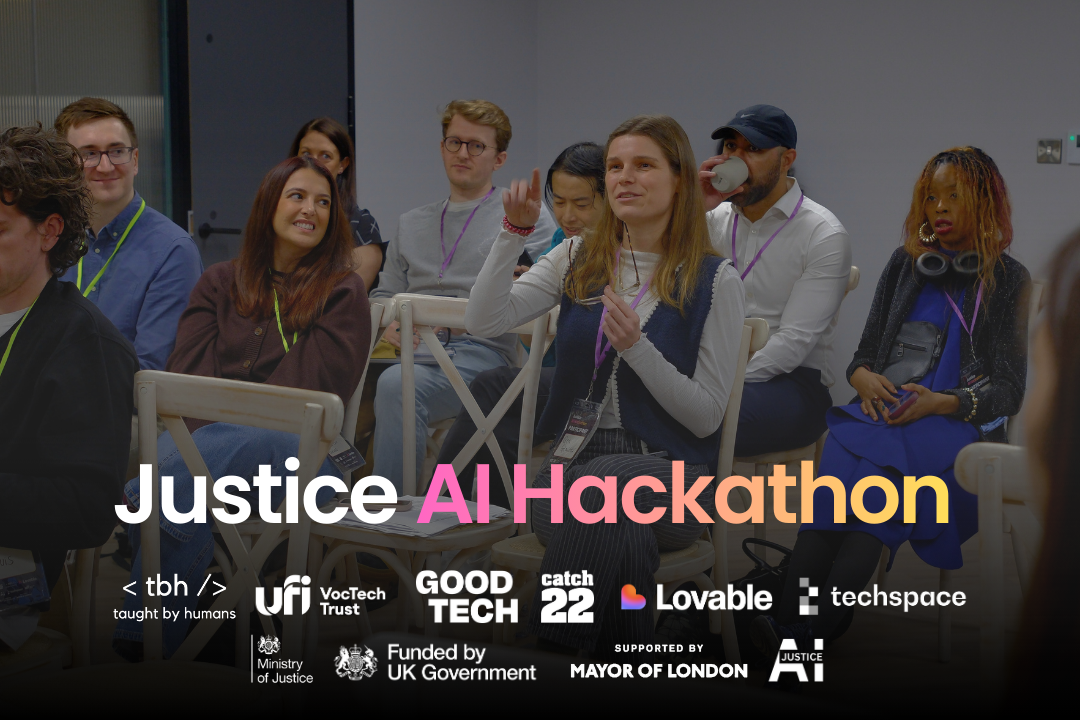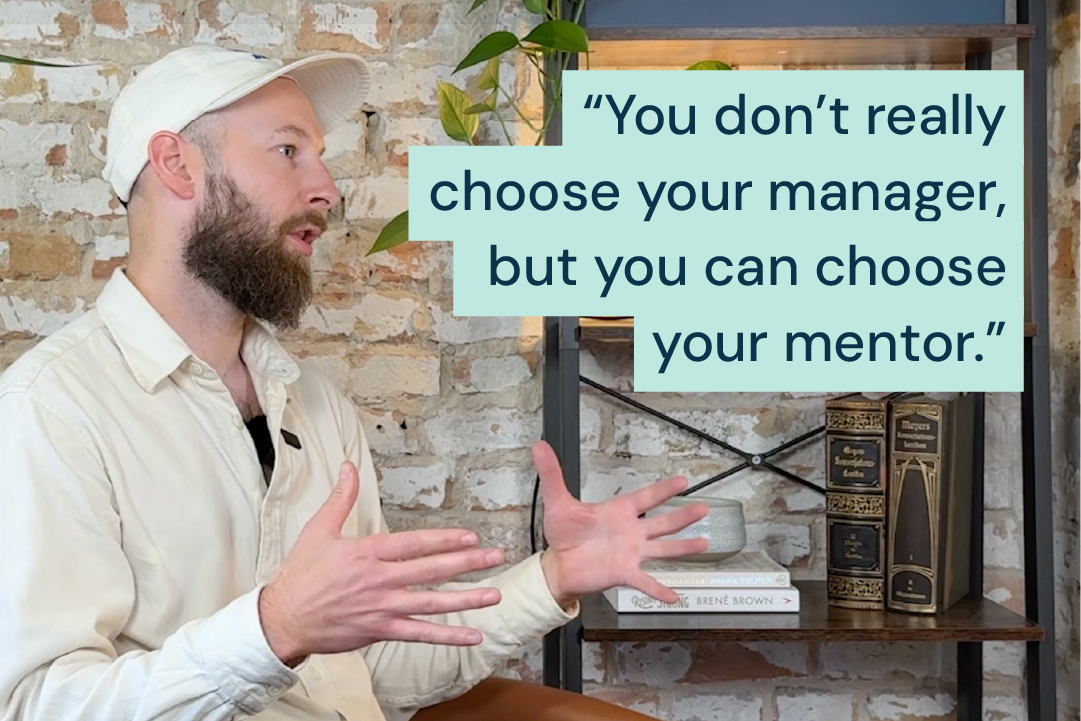Hannah (Founder & CEO of Lima) and Barry (Co-founder of Series Q) sat down for an intimate fireside chat at our venue, The Loading Bay. The room was buzzing with a diverse mix of seasoned entrepreneurs, ambitious dreamers, and everything in between.
This eclectic mix of attendees highlighted the inclusive and far-reaching impact of the Series Q community.
Hannah delved into the compelling story of how Lima came to be, sharing the inspirations and challenges that shaped her journey. She illuminated the crucial role of building a support network, finding a co-founder and offering invaluable insights, all before the room was transformed for the networking activity - with pizza of course.
This event reminded us that even on the coldest of December nights, warmth can be found in entrepreneurial spirit and the power of community!
What is Series Q?
Series Q is the LGBTQ+ network for entrepreneurs and creators in the UK. They host in-person and online events to provide a voice for LGBTQ+ workplace issues in the startup community, often enabling startups that are too small to sustain internal LGBTQ+ groups to provide a forum to connect, gain knowledge and be inspired.
What is Lima?
Lima is the first ads platform that connects businesses to private communities on WhatsApp, Slack and Discord. They noticed that social media is supposed to connect us but it’s actually made us more lonely and that real human connection is happening in private communities - just like Series Q.
Community managers (like Barry) have a huge amount of work to do and it's really hard to make money from communities so they are working on a chapter to make that happen.

The fireside chat interview:
Barry: You came to the startup world after doing a PhD. Why did you choose to start a business, rather than go down the more traditional route of taking a data job in finance, which, from looking at your CV, you could have done?
Hannah: That's generous. I did a PhD in crowdfunding & community building so I spent a lot of time researching what makes communities tick, what people care about in communities and then I went on to work at various startups as a community manager.
I was speaking to a few people before we started this and people are often like “it's amazing what you've done - that big, brave step”. But I think the reality is when you start a business, it's often these small, incremental steps of scary things that gets you to where you are.
I guess my stress threshold got to the point where nothing really satisfied me beyond running my own thing, so I started a consultancy.
Where did the idea for Lima come from? Were you already involved in some communities?
I think having worked in communities for so long, I knew that there was a desperate lack of tools for community managers so that's where it started. Me and my co-founder Alfredo, spoke to over 100 community managers. We were really just looking for what was the biggest problem and the things that came up was that they lack time, energy, and money.
They need more time to create engagement, more time to engage with people and most people do this voluntarily. I think a lot of communities are doing a really good job of monetising longer term-partnerships but there’s a whole host of businesses that are connected to communities that can’t do a large amount.
At the moment when you decided to get started, what did thaat journey look like? When you took that leap from doing freelance consulting to setting up your own thing, were there any support networks that you drew on?
When I write my memoir, I’ll make this sound like it was all very strategic. But really, it feels like a bit of an accident. But in terms of support networks, absolutely, the community has always been a part of my career for the last few years.
I'm part of lots of female founder communities, lots of queer networks. Of course there are commercial opportunities within communities, but really it's just about having people going through the same things. So, commercial communities and then also friends helped.
Sometimes at Series Q, we hear people talking about loneliness in the journey of setting up a business. Is this something you’ve experienced?
I do manage to have a social life but I think it's just that what you're doing, what your days look like and what your challenges are is just so different from most of your peers. What you are thinking about, what you are stressing about, I find it hard to find people to relate to.
There are many aspects of your life that need to be fulfilled, but there's one big aspect that's consuming most of your brain. It's hard to find people that understand that.
Definitely. Especially people with more structured jobs. When we talk about community, there's been that big shift over the last few years from offline communities - which Series Q has always traditionally been - to communities that take place on Slack or WhatsApp et cetera. Is one better than the other?
I don't think one is better than the other. The “perfect” community - if that exists, is a combination of online and in-person. Online, you can reach a wider scope of people, you see queer communities, communities that connect people with rare illnesses and without the range the internet offers, these groups are harder to find in person. But the connection you get with others in person is really cemented in us, and really important. So the combination of both is important.
What is the best way to find and engage with these communities?
If you see the value of a community, or you are looking for a community that doesn’t yet exist - start one. There are tonnes of directories for communities out there. Or just ask me this evening!
Are there any you can recommend now, or that are useful to you in particular?
The one I really like is called No Code Founders. If you aren’t a tech person but you want to start a tech business using a broad range of no-code tools, that’s a really good one. Female Founders Rise is another one. Also if there’s a content creator or influencer you follow, they’re likely to have a private community somewhere that you can usually find through their Patreon or newsletter.
I personally find it hard to engage in them. Say I’m added to a Slack channel of 300 people and maybe 30 of them are having a conversation and I feel like a bit of a lurker in the background. How do I engage in that conversation if I’m a bit nervous to do so?
There’s no one simple answer to that, it depends why you are there in the first place. Ultimately the best route is to message the community manager. They’ve started the community so they should want to assist new members. I think something that works well regardless of the community is just to post a funny meme!
Haha great - you’ll see plenty of memes in our next Series Q newsletter then. So, how did you go about finding your first customer?
At the beginning, it's good to engage in your network to start with. Our first customers came from people I've been working with for years, who were willing to understand that their experience wasn't going to be amazing, it was going to be as good as it could be and they might not get the results that they wanted and it might be really funky… but they trust you and they have more patience with you.
You mentioned your co-founder Alfredo earlier. How did you find each other?
I joined a program called Zinc which is similar to Antler. It's a pre-team, pre-idea accelerator.
You go through this process and basically get paid for 6 months to find a co-founder. It's an amazing deal and programme and I joined April of this year. I knew I wanted to create something in community. I met Alfredo, who exited the BC Wellbeing Marketplace the year before and he had always felt that the pillar of wellbeing that he never quite cracked was community. So we were really lucky that we both wanted to work in the same space.
Would you recommend such programmes to other aspiring founders in the room?
I absolutely recommend checking them out. As with lots of accelerators, there are good ones, there are bad ones, and there are some that are more suitable than others.
The biggest advice I would give is to see it as a co-founder matching tool. Don't see it as a place where they're going to give you a business or help you grow a business. The biggest benefit for me was meeting my co-founder. If that’s your main concern and you're willing to give up a little more equity than you would if you had a co-founder elsewhere, then go for it.
How do you go about finding employees or freelancers to work with?
I think it comes down to the network. With Zinc and Antler, they have a network that you can tap into which is ideal.
Part of building your network is being vocal about what you're doing, whether that be online or just in person, making sure everyone in your network knows who you're looking for, what challenges you're facing, and just galvanising everyone to help you out.
When you don't have any money, and no one knows about you as a company, it's really hard to use traditional means to find people.
The word ‘networking’ terrifies a lot of people. What do you think the most useful source of connection has been for you?
I genuinely find people interesting. Just being genuinely interested in what other people are doing. Think of it as making friends rather than purely commercial relationships. You just need to be yourself and connect with people like you normally would!
Can you talk through any other challenges you’ve faced?
When I was running my consultancy, I was working on my own in my flat for so long and was really unhappy. Joining Zinc and being around people again made me realise how difficult that period was. Learning how to manage my energy and understanding my needs took a lot of time.
The realisation, which is as clarifying as it is stress-inducing, is that in a startup you have the day your business is going to fail. Everything you do must push that day back.
Constant prioritisation is a challenge as you have to think: will this action stop my company from failing in six months. If it's not, consider outsourcing it or doing something different.
Similarly, your relationship with the company will also end. Hopefully, it's positive, and you exit successfully. But the reality might be that the role isn't right for you anymore, or you might face other issues.
I always have to think about how I'm pushing my personal limits back. These two aspects often conflict: what pushes the company further and what keeps me going. I discovered this when working for myself and am still trying to figure it out.
What are the best platforms for building an online community?
My opinion is that no perfect platform exists. The main decision you need to make, concerning exclusion, is ensuring you don't exclude anyone. This could be due to accessibility issues, identity issues, or age, and should be a priority. You should be inclusive based on who you want to reach.
Other than that, the main thing to consider is how the platform will scale with you. WhatsApp is the most popular community platform in the world, but it's not very scalable.
On the other hand, Slack is professional and reasonably scalable but it’s expensive. There's no perfect solution. Prioritise what's not exclusionary and what will help you achieve your three-year goal.
Have you observed any tipping points that turn a passive community into an active one?
Good question. Community engagement is highly complex. The big problem we're trying to solve is the lack of visibility on community engagement. Most people don't know how, why, and who are engaging or who the top contributors are. There's still a lot of work to do there.
The true tipping point, in my opinion, that turns a network from an audience to a community is when individual community members get value without engaging with the community manager.
If you, as the community manager, know you can step away and people in your community are still messaging each other and using your platform, that's quite significant. It may just be stepping away for one week, but even stepping away for 24 hours and returning to find people still talking is a good indicator. If you decide to monetise or change platforms, that's a good indicator.

Six takeaways from the interview:
Starting a venture happens in small incremental steps.
Starting a venture is often perceived as a leap into the unknown, but it's actually more about taking small, incremental steps. Each day brings small decisions and actions that cumulatively lead to significant progress. Whether it's market research, networking, or developing a prototype, these steps might seem minor but are fundamental to the bigger picture.
Understanding this helps manage expectations and mitigates the feeling of being overwhelmed, breaking down the entrepreneurial journey into manageable chunks.
Building a personal network is incredibly important
Building a robust personal network is crucial in the entrepreneurial world. It's a dynamic resource for finding co-founders, employees, mentors, and even your first customers. Engaging with like-minded communities, whether it be queer, female-founder, can open doors to unique perspectives and opportunities.
Networking is not just about professional gain; it's also about building a support system that offers guidance, feedback, and encouragement. If you are nervous about “networking”, try to see it as a way to be inspired, make new friends and a way to gain confidence.
Building a business can be lonely but there are ways to alleviate this
Entrepreneurship can be a lonely road, especially when your experiences vastly differ from those around you in more conventional roles who may not relate to your experiences and challenges.
Finding a community of like-minded individuals who understand the unique challenges of entrepreneurship is vital. This community can come from online forums, local meetups, or industry events. Additionally, seeking mentorship or coaching can provide you with a connection to someone who can empathise and guide you through similar experiences.
Online and offline communities have their benefits
In today’s digital age, the importance of online communities cannot be overstated, offering wide reach and accessibility. However, offline interactions are just as crucial, fostering deeper, more personal connections. A balanced approach, engaging in both online and offline spaces, can create a more robust and supportive network. This blend allows for reaching broader audiences online while solidifying those connections through in-person interactions.
Share your challenges
Being open about the challenges you face is vital. Discussing your journey, including the highs and lows, can be incredibly insightful and motivational for others. Reflecting on how you've navigated difficult decisions and periods of uncertainty can offer valuable lessons to fellow entrepreneurs. Your honesty in sharing these experiences can help in building genuine connections and fosters a culture of learning and resilience.
Prioritise constantly
Assess whether each action will move your company forward (and prevent failure in the short term). This often involves making tough decisions, like outsourcing tasks that don't directly contribute to this goal. Balancing what's best for the company and personal well-being is a challenging aspect of entrepreneurship, one that involves constantly pushing personal limits and adapting strategies for long-term success and satisfaction.








